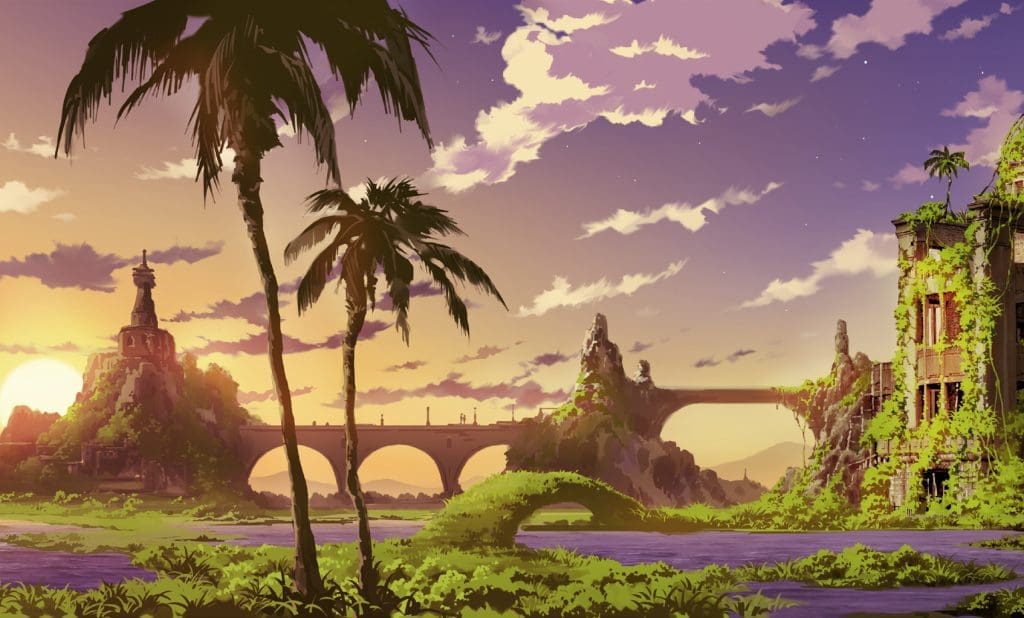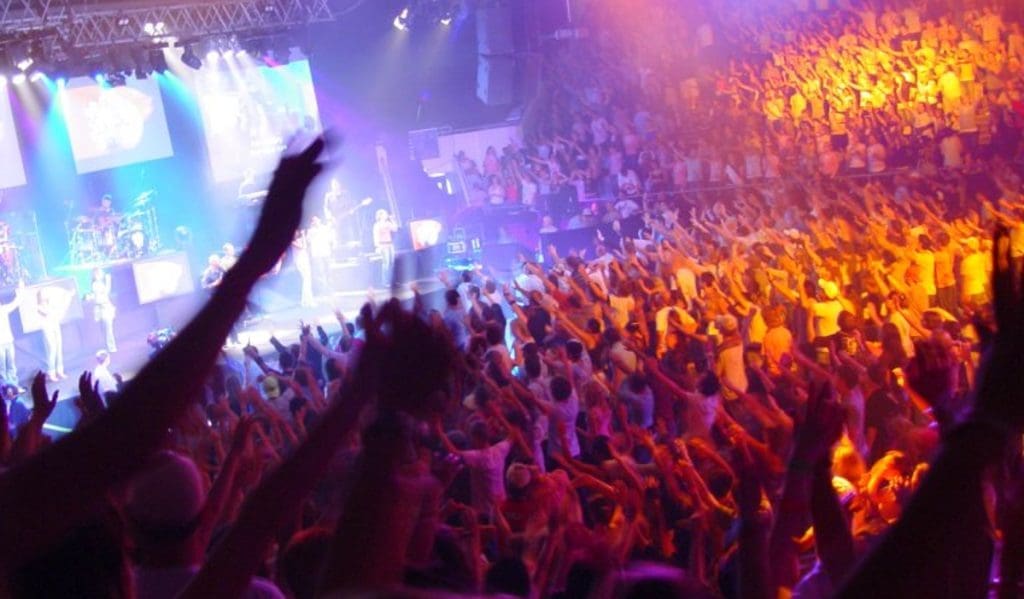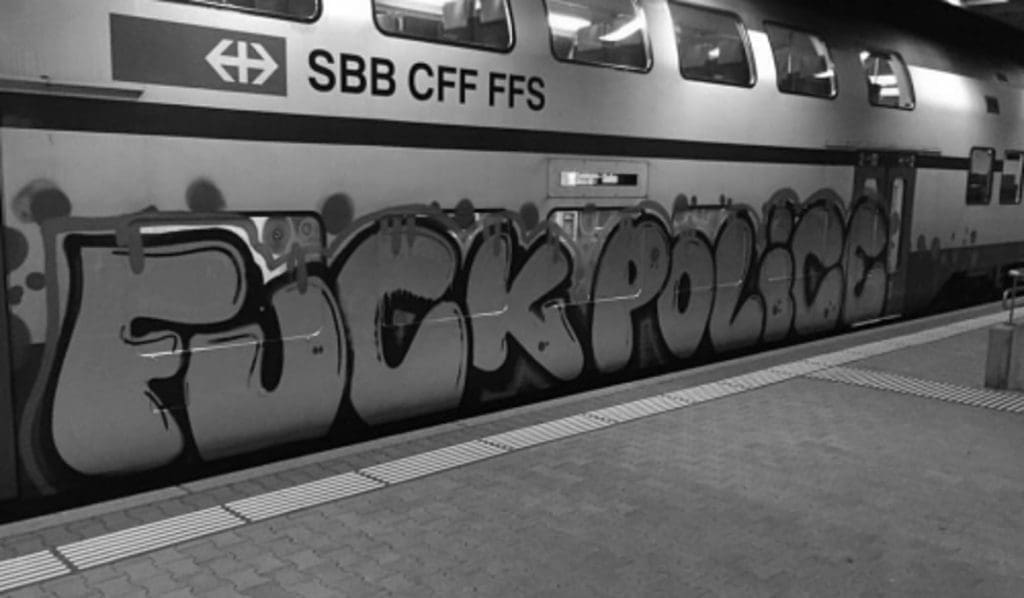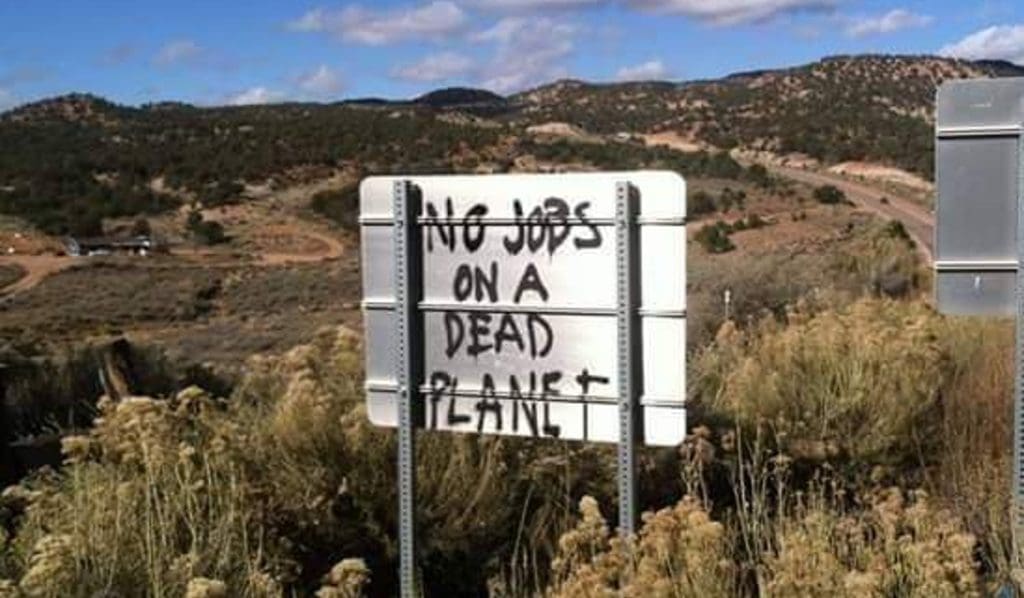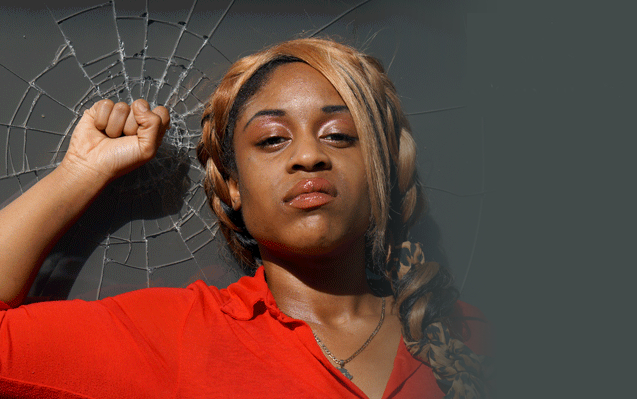Transcribed from the 14 July 2018 episode of This is Hell! Radio (Chicago) and printed with permission. Edited for space and readability. Listen to the whole interview:
We could, with a global revolution in socioeconomic structures, slow it down, and maybe mitigate it, but there’s no stopping intense and destructive levels of warming at this point. Presuming that if we just have the right legislation we can fix it is also a form of climate denial.
Chuck Mertz: This civilization needs to die. It’s made life meaningless, and is actively killing our planet with climate change. It’s time we move on to another, better civilization while humanity still has a chance to survive. Here to talk about our meaningless civilization that’s destroying Earth, and to help us figure out where we can go from here, Roy Scranton is author of We’re Doomed. Now What? Essays on War and Climate Change. Roy was on This is Hell! in 2015 to talk about another happy book he wrote, Learning to Die in the Anthropocene: Reflections on the End of a Civilization.
Welcome back to This is Hell!, Roy.
Roy Scranton: Thanks for having me on again, Chuck.
CM: It’s great to have you on the show.
We got so many comments about that conversation we had back in December of 2015. We got people saying that it made them very depressed, but also that it gave them some form of hope, and I think that is going to happen if people read your new book as well.
You write, “The time we’ve been thrown into is one of alarming and bewildering change: the breakup of the post-1945 global order, a multi-species mass extinction, and the beginning of the end of civilization as we know it. Not one of us is innocent, not one of us is safe.”
In the choices that you see us making, how much do you see them being guided by this bewilderment? Are our choices and decisions confused and uncertain because we live in confused and uncertain times?
RS: That’s probably a pretty good take on it. There’s a whole range of things that limit our decisionmaking and our world view, even just simple stuff like a basic human tendency to look to short-term solutions to problems. Then there is the cultural tendency to focus on the short-term: in this capitalist culture we live in, thinking generations and generations down the line is really not rewarded.
So there’s a bunch of stuff that’s closed in our view and made it really hard for us to think outside of this moment, which is incredibly confusing and difficult and grim and weird. You follow the news every day, and it’s impossible to know what to make of it, to the point where people are just self-selecting out the narratives that they want to believe in, and then following those and ignoring contrary data. There’s a lot going on right now that makes it really hard even for reasonable, intelligent, thoughtful people to reflect with any kind of depth on our predicament.
CM: So if you are somebody who is on the right and does not understand anybody who would listen to or watch or believe anything they see on MSNBC, or somebody, conversely, who is a huge fan of MSNBC, always has it on, who cannot understand how anybody could ever watch FOX news or believe anything that it says—how much do you think that kind of disconnect is driven by climate change?
RS: That’s a really interesting, complicated question. I wouldn’t say that the political tribalism at work in the United States now is directly driven by climate change. Climate change is one of the major factors behind a general sense of anxiety and unease. Still, there’s a lot more going on as well, including the globalization and cultural homogenization that has been happening over the last twenty years: it made people anxious to know who they are, and to be able to say who they are. That’s one of the things going on now. Behind political tribalism is a desire to be able to identify oneself as belonging to a certain group, and doing that by refusing to accept some other group. And it’s happening all over the political spectrum.
Climate change is part of the background for that kind of tribalism as a factor of general anxiety and fear, but I would hesitate to say it’s directly connected to that exact political division. Still, there’s another thing to say on that, which is a point Naomi Klein made in her book This Changes Everything: people who are invested in capitalism and the capitalist status quo are going to have a committed investment in denying the truth, denying the scope and scale of anthropogenic global climate change. Because if you accept the science and you accept the consequences of what’s happening with climate change, then you cannot deny that we need to completely change this capitalist system, because it is industrial fossil fuel capitalism that’s caused it.
In that way, climate change may in fact be directly driving tribalism insofar as it is forcing the capitalist party to double down on their ideology, which then provokes a similar response from the other side. You get Trump and Bernie Sanders in 2016 as the two lively agents in the election. There’s more that could be said, but that’s sort of an idea of how climate change is working in the current political spectrum.
CM: There are a lot of people on the liberal side or farther on the left who are stymied by the idea of climate change denialism that they see on the right. But you write, “Rightwing denialists insist that climate change isn’t happening or that it’s not caused by humans, or that the real problem is terrorism or refugees, while leftwing denialists insist that the problems are fixable, under our control, and merely a matter of political will.”
Are leftwing denialists, as you call them, actually in denial, or are they accepting the idea that the world is being drastically changed by climate change and only in denial by insisting that we can do something about it? Is it still a type of climate change denialism to think, well, we should be worried, but I’m certain a new technology will come along to fix this problem?
RS: To me that’s definitely a form of denialism. Let me be specific about how that’s the case. It’s precisely in the insistence that it’s fixable, that we can solve it with the proper technological or market-based solution—you just get the right carbon tax and some carbon scrubbers and it’s all going to be fine; we just need to organize; we just need the political will; we just need the right charismatic political leader to make it happen; we just need the right legislation. That’s a form of denial, because—number one—it’s denying that significant and catastrophic levels of warming are already baked into the system because of the amount of carbon dioxide that we’ve already released into the atmosphere. The Arctic is in meltdown right now, and there’s no stopping that. We could, with a global revolution in socioeconomic structures, slow it down, and maybe mitigate. But there’s no stopping intense and destructive levels of warming at this point. Presuming that if we just have the right hope or the right legislation that we can fix it is already a form of denial.
If we keep clinging to the story that we have, that technology will save us and everything is going to get better, and that our identities are constructed through consumption and by race and nationality and so on, it’s going to be bad.
The second way that this kind of liberal and sometimes progressive incrementalism is a form of denial is in its faith that the system as it now operates is capable of addressing this global problem; that American democracy, such as it is, and American capitalism, and the global organizations that were built after World War Two to help sustain American hegemony and global capitalism—that those organizations are capable of completely gut-renovating themselves. That just seems fantastic to me. Those organizations are all built around an energy economy that is driven by oil. We can’t talk realistically about solutions or even mitigation, about slowing down this death train, until we are able to talk about complete transformation of the global energy system—off fossil fuels.
CM: You write, “As the gap between the future we are entering and the future we once imagined grows ever wider, nihilism takes root in the shadow of our fear. If all is already lost, nothing matters anyway.”
How do you see our actions reflecting any overall sentiment that life is, in this age of climate change, meaningless?
RS: There’s a lot of desire for meaning. This goes back to that tribalism. Your life can make sense to you if you define it as being against somebody else, whether you’re against Trump or you spend all your time “owning the libs.” You can make your life make sense in that way, but if we take a step back and look at the bigger picture of our culture…it’s easy to make generalizations talking in this way, but if we look at the phenomenon of “incels” and all these young guys who are following a moron like Jordan Peterson, or the school shootings and other shootings in public over and over again, all over the place—these are symptoms. The support that Trump has found among Americans in the middle class, in the working class, on the coasts and in the flyover states—there’s a nihilism at work. There’s a terror of the void, and a desire to make meaning, to make life meaningful, even to the point of violence.
If words stop making sense, then at least you can depend on action. You can do something, and that means something. If you kill someone, that means something. More and more people are making this decision; it is a phenomenon in our culture that seems to be increasing. We can find other symptoms as well: TV shows like Game of Thrones or Walking Dead or Westworld. We could do that kind of thing and talk about more specific cultural symptoms. But if we look at the culture from a medium view, if we step back, we can see a pervasive nihilism, and what’s more, an anxiety about nihilism, a reaction against the fear that this is all meaningless and it goes nowhere, an acting out in order to create meaning in the world, even—and sometimes especially—through action.
CM: But as you also point out, you don’t have to find that meaning through nationalism, sectarianism, war, and racial hatred. Why doesn’t that sense of meaninglessness lead to a search for true meaning to life via collectivism, peace, and love for your fellow human?
RS: Because that’s hard! It’s hard. Two things: one, our connection to really universal sorts of values is quite tenuous. It’s the project of a lifetime. There are religious ascetics, spiritual strivers, and philosophers who have worked to help people strive toward universal ideals that aren’t reducible to tribalism or nationalism or sectarianism. But committing yourself to those kinds of ideals demands a repudiation of one’s specific, historical, embodied, territorial, ethno-religious identity. If you’re committed to everybody, if everybody deserves equality and we need to love everybody, and we need to have compassion for everybody—that’s a huge, tremendous burden, and it’s a tremendous challenge.
In our day-to-day lives, it’s me, it’s the people around me, and I’ve got to take care of that. I’ve got to go to work, and I’ve got to pay my bills, and I want my cable, and this guy cuts me off in traffic, and it’s all about me and mine, and those are where my investments are. Those are where my physical, embodied, lived investments are. To say no to that…it’s like Jesus on the Mount saying you can only come to me if you give up your parents, you can only come to me if you’re willing to die. It’s an old spiritual idea that the path to wisdom is learning to die. I talk about that in my first book, and I talk about it more in this one.
But it’s tremendously difficult. I’m not confident that it’s something that will ever take hold in the majority of human beings, because it’s a difficult thing to do.
CM: You write, “Scientific materialism taken to its extreme threatens us with meaninglessness. If consciousness is reducible to the brain and our actions are determined not by will but by causes, then our values and beliefs are merely rationalizations for the things we were going to do anyway. Most people find this view of human life repugnant, if not incomprehensible.”
In your opinion, does atheism make life meaningless? I know I’m going to get feedback from atheist listeners, so before they send those emails and direct messages I want to make certain I have your response ready. Can you find meaning in life without religion or spirituality in some sense? Do you think that meaning in life is lost when you are an atheist?
RS: This is the amazing thing about being a human being. I’m not sure that we really have free will. I don’t believe that we were put on this planet by some god or alien or I don’t know what, the Flying Spaghetti Monster. There’s no evidence for that. We’re animals that evolved out of other animals, and we’ve been extremely successful on this planet as apex predators, and we’ve overrun our environment, and we’re probably headed for a population correction that’s going to be pretty ugly.
But! The thing we’re really good at as humans is adapting, and part of the way that we do that is through what we’re doing right now, you and me. We’re talking. We’re using symbols. We’re using words and concepts to articulate and elaborate a model of reality. We’re participating in a collective storytelling that is the project of culture. We’re making meaning. Right now, you and I, having this conversation, we’re making meaning. That’s what we do as humans: we make our lives meaningful in order to organize collectively to achieve goals that we could never accomplish on our own.
Society tells me to think about my daughter’s future in certain ways, like a college fund, and what’s her career going to be? How is she going to get a job? How is she going to have financial security? And at the same time there’s this deep awareness that all this is dead. This civilization is over, and we’re just going through the motions at this point.
So, yes, human life is meaningless. But it’s not meaningless at all when we as humans make meaning. That’s how we organize ourselves together collectively. This is the hope I have for our ability to get through the upcoming transition to some other existence: that we might be able, collectively, to create a new story, create a new collective sense of meaning that’s going to help us make the transition in a less horrible way than what will happen if we don’t.
If we keep clinging to the story that we have, that technology will save us and everything is going to get better, and that our identities are constructed through consumption and by race and nationality and so on, it’s going to be bad. It’s going to be very bad, because that story is not working.
Hopefully we can create something new, some new collective sense of meaning that will help us make this transition in a less catastrophic and horrible way.
CM: You point out that we need to “let our civilization die.” That might sound incredibly frightening to people. But have other civilizations died in the past, and humans survived with a new civilization that became something that had been inconceivable in the past?
RS: Over and over again. This happens over and over again. That’s human history, the history of failed civilization. Sometimes in the West, in the US, we have this Whig version of American history where we are the culmination of civilizations building on each other. There’s the Greeks and the Romans, and then medieval Europe, and then the Renaissance and the Enlightenment and industrialization, and now we’re here and we’re the greatest, we’re the best. But that version of history ignores the fact that ancient Greek civilization failed. It fell apart. Roman civilization failed. It fell apart. Medieval European civilization broke apart. It didn’t work, and it changed into something else, over and over again.
And this is not even to bring up various other civilizations in Asia or the Americas. One of the most instructive locations to look at this kind of transformation is in the European conquest of the Americas, because there were multiple civilizations here that were completely destroyed by the European conquest, and something new happened. I don’t think it’s a great model of how to do that, but there’s a lot to learn there from what happened and how people thought about the transition.
The philosopher Jonathan Lear has a book about this called Radical Hope, which looks at the Crow tribe in North America and how they handled the conquest of the plains differently from, say, the Sioux, and what consequences there were for the more adaptationist view that the Crow had versus the more resistance point of view that the Sioux had. There are lots to say about this, and it’s very complicated, but there’s a lot there for us to look at.
CM: The last essay in your book is really intense, and it’s a topic that I’ve wanted to talk about for a long time on this show. I’ve found some writers who are writing about it, but the way that you write about it is really eye-opening.
You write about holding your daughter, Rosalyn, for the very first time as a newborn, and how you cried for joy, and then sorrow: “Looking out the window over the hospital parking lot, the rows of cars, the strip mall across the street, the flat, ugly Rust Belt sprawl of northern Indiana, box stores and drivethrus, drainage ditches and concrete waste fields that might once have been oak groves; a world in which the landscape had been ravaged and brutalized as a matter of course, and in which any possibility for living in harmony with nature had been evacuated; birds and bees and frogs were all dying, seasons were out of joint, and instead of grieving, people were on their phones; my partner and I had in our selfishness doomed our child to life on a dystopian planet, and I could see no way to shield her from the future.”
You said to your daughter, “’I’m sorry,’ I told her, weeping, as her tiny fingers gripped mine. ‘I’m sorry you have to live in this broken world.’”
How do you reckon your awareness of an apocalyptic future and your and your partner’s decision to have a child?
RS: It’s difficult. It’s difficult negotiating with the sense of despair that opens up sometimes. It’s difficult making sense of the choices and the options that are presented to me now, as a parent in twenty-first century United States culture. Society tells me to think about my daughter’s future in certain ways, like a college fund, and what’s her career going to be? How is she going to get a job? How is she going to have financial security? And at the same time there’s this deep awareness that all this is dead. This civilization is over, and we’re just going through the motions at this point.
Reconciling that is not something you do once and then it’s done. It’s a constant process. One of the things I keep coming back to, actually, is from another essay in the book. In 2014 I went back to Baghdad for Rolling Stone and wrote about it in the magazine, and the version in the book is the writer’s cut: it’s a much longer version of that trip, because it was a really important trip for me. Part of that was talking with people who lived in Baghdad, poets and writers and students and cops and all kinds of people. I talked to one guy who had come to the US—he’d gotten a visa to bring his wife to the US, and when they found out she was pregnant, they decided to move back to Iraq. It seems like that’s a crazy idea. But he found the US so racist, and so disconnected from where the meaning in his life was, he wanted to raise his child in a place where he felt connected to life, where life was meaningful to him.
I talked to a poet who’d been thrown in prison by Saddam, and he was so excited when the US came that he was dancing in the streets. But then of course the US invasion and occupation was a load of crap in the end, and he was profoundly disappointed and very pessimistic. I asked him, “Are you hopeful about Iraq’s future?” This is 2014. Things had been going okay, there was a new election coming, but ISIS had just emerged, and there was a real question about what happens now. And he told me he wasn’t hopeful—but beyond hopelessness there is a new kind of hope that opens up, which is a faith in the basic tissue of human existence, our connection to one another, our ability to persist in even the worst conditions, our ability to make joyful, meaningful, rich lives in the shittiest places.
The only morally pure position on climate change is to commit suicide. That’s the only way to zero out your carbon footprint. If you take that line of thought, it ends in self-immolation. I can’t do that. I can’t make that choice. I’m committed to this world and life in it, complicit and complex as it is. I have to give up on moral purity, because I can’t go that far. What I can do, though, is try to live ethically in a broken world.
Human beings, modern homo sapiens, have lived on this Earth for two hundred thousand years, and only for the last fifty have we had—in the US—the kind of standard of living that we now think is essential to have. For most of human existence, life has been pretty gritty, pretty scrubby. But there’s no evidence at all to suggest that people before now were more miserable than people are now. In fact, some evidence suggests just the opposite, that our modern technology has actually made us less happy than we were when we had simpler lives.
The future is inescapably grim. But I do have hope that my daughter can have a rich and meaningful and worthwhile life even in those conditions, because that’s what human beings do.
CM: Just to be clear, you’re not saying that we have to retreat to an earlier time, to start acting like fifteenth-century human beings. In your book you say we can’t let our creativity be dulled or be ignored, and that we need to move forward, but that that still might bring us to ideas of our past. Correct?
RS: That’s right. More to the point: it’s not that I don’t think we should, it’s that we can’t. We literally cannot go back to the past. It’s not feasible, it’s not even possible, for so many reasons—not least of which being that five hundred years ago there were probably around a billion people on the planet at most. And now there are seven and a half billion. So to live the way people lived five hundred years ago—it’s not possible to have that many people on the planet live that way. The only way this many people can live on this planet is with modern technology. So something’s going to happen. There’s going to be transition. Hopefully there’s going to be innovation and creativity, thinking through and working to make this a transition and not a total collapse into brutality and anarchy.
CM: You write, “To be honest, though, having a child hasn’t really inspired me to acts of self-sacrifice in the service of abstract and doubtful goals. Rather the opposite. I’ve had to start thinking about schools, healthcare, housing, and investment in whole new ways. I feel a deep obligation to provide for my child’s future within the constraints of contemporary American society, which demands making some kind of uneasy peace with America’s brutality, with its hierarchical, racist, and individualist culture. This is how young radicals become middle-aged liberal hypocrites. My love for my daughter is overwhelming and irrational, and consumer capitalism exploits that every day by whisper-screaming in my ear that if I don’t do everything I can to make sure my child has more than yours—more whatever, the best whatever—then she’s going to fall behind. The immense engines of capital, I have learned, possess a formidable array of forces that only activate once you’ve had children; then they fall on you with the force of a thousand suns.”
Does having children, then, make you more complicit in the problems that cause climate change, and reinforce institutions you believe need to be destroyed to save us from global warming’s worst consequences?
RS: It does. I was already complicit. We’re all already complicit in it. But the only morally pure position on climate change is to commit suicide. That’s the only way to zero out your carbon footprint. So we’re all already complicit. But yeah, having a child does increase that, complicates it and entangles it more.
But then it’s a question: What do we need to make human life meaningful? If the way we decide to make human life meaningful is to eliminate everything that we are built to find important, then what kind of life is that?
If the way to make human life meaningful in relation to climate change is to give up having children, what does that mean for us? It means we’re giving up the idea of the future. We’re trading a possible future without climate change or with less climate change for the idea of no future at all. It’s children who take humanity into the future. If we give up children, then we’re giving up on the basic structure of the biological cycles of human life.
And we can do that. But again, if you take that line of thought, it ends in self-immolation. That’s a position against which I have no defense. It’s a frightening and awesome position. I say that with full awareness of the reality of it. David Buckel did this in April of this year. He lived in New York. He was an LGBT attorney. He went down to Prospect Park and lit himself on fire. The notes that he left said that he did it because of climate change, as a protest against our inaction. He made that decision, and I have nothing but awe and respect for that choice.
I can’t do that. I can’t make that choice. I’m committed to this world and life in it, complicit and complex as it is. I have to give up on moral purity, because I can’t go that far. What I can do, though, is do the best I can to live ethically—and teach my daughter to live ethically—in a broken world, and to work toward helping to create a new culture that can make this transition to a new world. I can commit to that, I can do all that. But I’m still human.
I’m still trapped in being human. I’m not the Buddha yet. Ask me again when I’m eighty, and we’ll see. But for now I’m still muddling through like everyone else.
CM: Roy, thank you so much for being back on This is Hell!.
RS: Thanks for having me on, Chuck, it’s always a pleasure.

